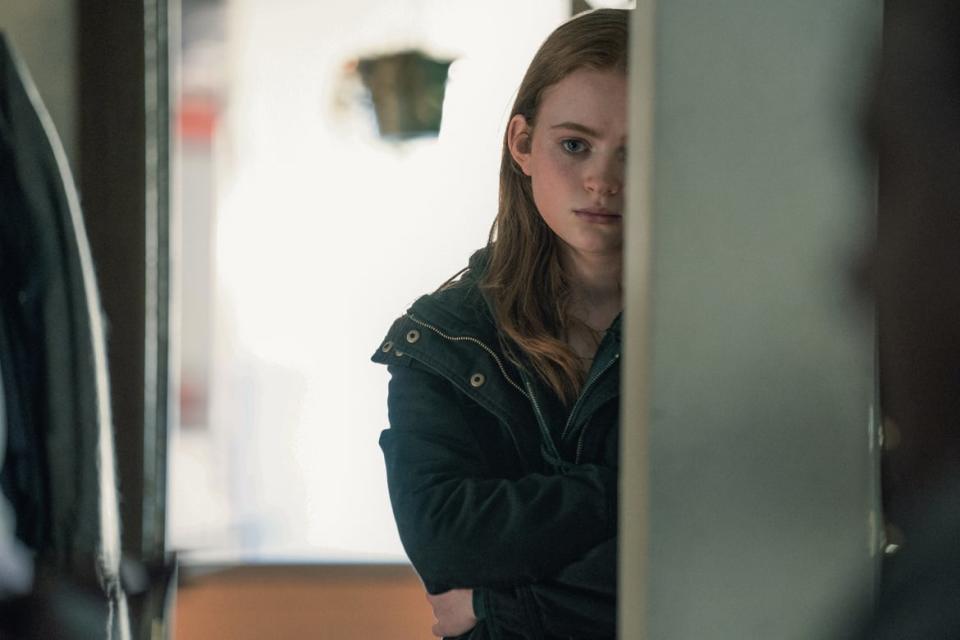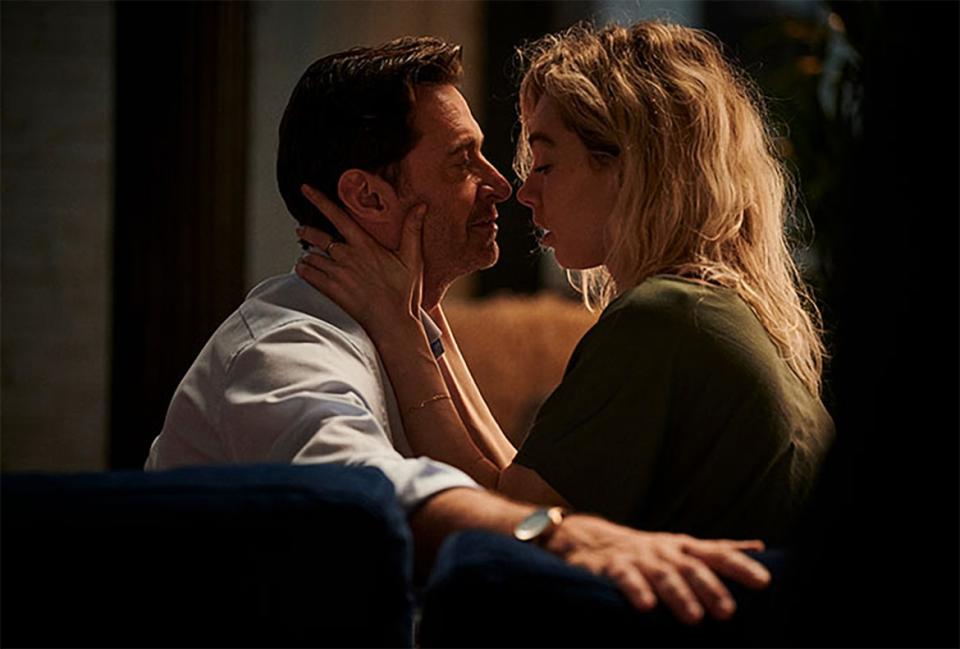From ‘The Whale’ to ‘The Son’: The Year Movies Became Misery Porn

- Oops!Something went wrong.Please try again later.
- Oops!Something went wrong.Please try again later.
- Oops!Something went wrong.Please try again later.
Look, it’s Oscar season, and moviegoers understand that things are about to get taxing.
This time of year, we’ve grown accustomed to seeing stories with blood, sweat, and, most especially, tears as the season typically offers more adult fare.
This fall, Till portrayed the tragedy of Emmett Till’s lynching and provided a transformative and psychologically immersive portrait of his mother Mamie Till’s activism. Over the weekend, Women Talking hit theaters after a strong film festival run. Sarah Polley’s film takes the legacy of sexual abuse inflicted upon women in patriarchal societies and asks philosophical questions that reveal how to emerge towards a hopeful, safe future.
While those are heavy, but impressive movies, too often the search for statues and critical praise flatly equates watching something painful with watching something serious or thoughtful. For some films, leaning in on the suffering means coming up short on actual insight or a unique perspective on the human condition. And in the process, we lose the human story, the reason people go to the movies in the first place. Those are simply misery porn, and there are a few of them lurking in this season.

The Whale
Warning: Spoilers ahead for several new releases.
The season’s worst offender is Darren Aronofsky’s The Whale. Adapted from Samuel D. Hunter’s highly divisive play, the film stars Brendan Fraser as Charlie, a homebound 600-lb. professor attempting to reconcile with his estranged, cruel daughter (Sadie Sink) as he anticipates his death. Over the course of the film, we learn Charlie’s full heartbreaking situation: an affair with a male student that ended his marriage, the religious self-hatred that drove his lover to suicide, and Charlie’s feelings of guilt over his death. We are meant to see him more humanely than we did when we met him. But The Whale wants to put the audience and Charlie through the wringer.
Aronofsky is no stranger to depicting the human body horrifically, whether through the ravages of addiction in Requiem for a Dream or turning Natalie Portman into a bloody, horny swan. In terms of depicting a character’s willingness to commit self-harming acts at risk of their possible demise, The Wrestler might be Aronofsky’s empathic magnum opus.
'The Whale' Is a Cruel Exploitation of Obesity Saved by Brendan Fraser’s Performance
Comparing that film (which shares copious parallels to The Whale, from father-daughter estrangement to the intended second coming of its star) to Aronofsky’s latest only further highlights the latter’s deficiency in this regard. The Wrestler’s Randy the Ram was a tragic figure who was given complicated dimension that makes us understand, and even love, him; Charlie in The Whale is granted complexity of pain, but not personhood.
The film would rather make Charlie a divine saint, willingly accepting his daughter’s constant epithets and speaking like a motivational cat poster (his hushed “people are amazing!” features prominently in the trailer) than a complete person. This makes the character as written feel hollow, no matter how charismatic the actor who plays him. Fraser is tasked with pulling our heartstrings throughout in a ceaseless torrent of tears, but he’s not given the luxury of an arc to play. The film might think it is distinguishing Charlie by his unconditional love, but Hunter’s script defines Charlie purely through his suffering.
The Whale also thinks its pleading for compassion, while stylistically enacting the opposite. Aronofsky and cinematographer Matthew Libatique shoot the film in the square Academy ratio (where the images you see are a claustrophobic box, rather than a wide rectangle to absorb more of the environment) so that Charlie’s body fills the frame. The film leers at his naked body while showering. Aronofsky plays a night of Charlie’s self-punishing binge eating like the stuff of a monster movie, complete with howls and lightning crashes.
Brendan Fraser’s Shocking Binge-Eating Scene in ‘The Whale’
The title itself is a troll, dodging a slur with the film’s flimsy allusions to both Moby Dick and the biblical Jonah. Meanwhile, Rob Simonsen’s boomingly mournful score projects all of the pitying emotions at us that the film demands we feel. Rather than creating authentic empathy from the audience, the film is more interested in making a spectacle of Charlie’s suffering and his body.
Why would the film do all this if it thinks it is operating from a place of compassion, or that it earns it from judgmental viewers? Is it because it is laying a trap for the kind of fat-hating judgment for Charlie it flatly assumes the audience possesses? If so, it illustrates why the film is so fundamentally compromised: It is utterly certain that no one in the theater could have compassion for Charlie before the film begins, let alone that someone like Charlie might be in the audience. All the film’s posturings towards empathy come out looking phony.
A different kind of dehumanization occurs in Florian Zeller’s The Son. In this, Zeller’s follow-up to The Father—which earned the writer/director a Best Adapted Screenplay Oscar—Hugh Jackman stars as a successful man rebuilding his life with a new wife and baby, whose bliss is broken when his ex-wife (Laura Dern) alerts him to their son Nicholas’ (Zen McGrath) emergent psychological troubles. The film that follows is mostly stagey back-and-forth arguments and appeasements between father and son, divorced mother and father, and newlyweds, with little illuminating any of the characters or the particulars of Nicholas’ illness. Its tragedy feels wholly, grossly, inevitable.

The Son
The trouble with The Son is how its characters speak about mental illness and how McGrath’s Nicholas describes his experience. The young actor is given few avenues to allow us into Nicholas’ experience and is saddled with cringey, over-articulate dialogue that sounds completely alien coming from any teen, let alone one in distress.
Jackman and Dern, as his parents, are tasked with equally broad proclamations about how they love and care for their child. At some point, everyone begins to sound like sad robots, with the film’s dialogue so stilted that it separates us from the real world pain it struggles to dramatize. The effect is much more reductive than you might expect the storytellers were intending here, oversimplifying and stripping specificity from Nicholas’ condition to after-school-special territory, without much to take away from it.
Hugh Jackman’s ‘The Son’ Is a Shocking Misfire of a Film
In the end, Nicholas ends his life off-screen, and the audience is left to linger in the sounds of his parents’ anguish at discovering his body; the film then needlessly pulls a fast one in making us think he survived and thrived, only to reveal that this older Nicholas is merely a vision in the guilt-stricken father’s mind. Whatever meaning there was to be gleaned from the film is ultimately buried by the unfaceted hurt it puts us through, and the film seems to think that is enough.
The Son feels more explicitly like an embarrassment for almost all involved, a failure to accurately depict the reality of its tragic circumstance as it is lived by those who experience it. Whereas Zeller was able in The Father to empathically place the audience into the experience of dementia with a few structural tricks, The Son just feels like Zeller is rubber-necking.
Hugh Jackman’s Godawful ‘The Son’ Ends in an Unbelievably Cruel Way
A more delicate approach can be found in Cannes Grand Prix winner Close, the story of two young male friends thrust into the social growing pains of teen masculinity from sophomore filmmaker Lukas Dhont. Léo (Eden Dambrine) and Rémy (Gustave de Waele) are inseparable, adored by both of their doting families and unassuming about the physical and emotional closeness that they share. Once they enter a new school, and their uncommon—for boys—relationship is noticed, Léo distances himself and things shift irreparably.
On first glance, the film holds immense potential to defy the kind of emotional manipulation that fuels the likes of The Whale and The Son. It seems like it could have something to say about queerness or teen mental health issues that neither of the other films muster. But it quickly sacrifices that potential by turning suffering into a plot device. At the film’s midpoint, Dhont pivots the narrative with Rémy’s suicide. Through the rest of its running time, Léo is plagued with guilt (like The Whale’s Charlie was over his lover) and fumbles for reconciliation and acceptance from Rémy’s mother (Émilie Dequenne).
Close is perhaps the thorniest among the current misery porn trend because the virtues of its thematic intentions are the clearest.
The film (which is Belgium’s Oscar submission for Best International Feature) may have some of its heart in the right place, particularly in regards to the impact of traditional gender roles on even children within open and accepting households. But by positioning Rémy’s death as a twist, the film immediately calls to question the motivation of using a traumatic event, especially involving a child, as a “gotcha” on the audience. Even if the gravity of the situation is presented appropriately in the film, is this really a subject that is fair to spring on an unknowing audience?

Close
Once Léo learns of Rémy’s death, Dhont loses interest in things like masculinity and burgeoning queerness. From this point on, Close becomes a film mired in unfathomable grief, without much to say beyond it. Dhont almost luxuriates in his actors’ tears, demanding the same from the audience without giving them anything to consider beyond. If not as exploitative as his more outright dubious debut Girl, Dhont’s latest abandons its themes for the sake of its manipulative impulses, gesturing towards a statement but without ever finding it.
The year hasn’t been lacking in films that turn painful circumstances into empathy, however, like the aforementioned Till and Women Talking. But this taxing trio of films lies squarely in one of the most alarmingly persistent of trends during award seasons as films making a misery soup out of serious subjects. By not giving their subject matter enough thoughtful consideration both for its characters and for the audience, their misguided treatments prevent the audience from actually grappling with the everyday conflicts that they wish to address. The result is that these subjects stay difficult to discuss openly and holistically, leaving people like these characters still misunderstood and stuck in the margins.
Get the Daily Beast's biggest scoops and scandals delivered right to your inbox. Sign up now.
Stay informed and gain unlimited access to the Daily Beast's unmatched reporting. Subscribe now.

